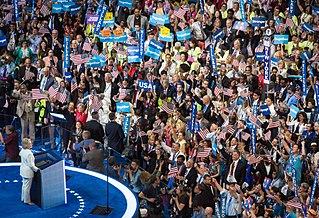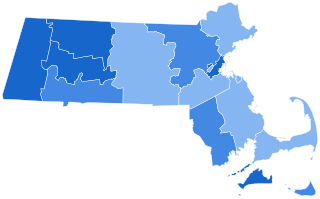
Each of the 50 U.S. states, the District of Columbia, and territories of the United States holds either primary elections or caucuses to help nominate individual candidates for president of the United States. This process is designed to choose the candidates that will represent their political parties in the general election.

The Democratic National Convention (DNC) is a series of presidential nominating conventions held every four years since 1832 by the United States Democratic Party. They have been administered by the Democratic National Committee since the 1852 national convention. The primary goal of the Democratic National Convention is to officially nominate a candidate for president and vice president, adopt a comprehensive party platform, and unify the party. Pledged delegates from all fifty U.S. states, the District of Columbia, and the American territories, and superdelegates which are unpledged delegates representing the Democratic establishment, attend the convention and cast their votes to choose the party's presidential candidate. Like the Republican National Convention, the Democratic National Convention marks the formal end of the primary election period and the start of the general election season. Since the 1980s, national conventions have become mostly inaugural events for the winning candidate, since winners are announced long before the convention. In 2020, both major parties, and many minor parties, replaced their usual in-person conventions with virtual programs due to the COVID-19 pandemic.
In American politics, a superdelegate is a delegate to a presidential nominating convention who is seated automatically.

From January 3 to June 3, 2008, voters of the Democratic Party chose their nominee for president in the 2008 United States presidential election. Senator Barack Obama of Illinois was selected as the nominee, becoming the first African American to secure the presidential nomination of any major political party in the United States. However, due to a close race between Obama and Senator Hillary Clinton of New York, the contest remained competitive for longer than expected; neither candidate received enough pledged delegates from state primaries and caucuses to achieve a majority, without endorsements from unpledged delegates (superdelegates).

The 2008 Iowa Democratic presidential caucus occurred on January 3, and was the state caucuses of the Iowa Democratic Party. It was the first election for the Democrats of the 2008 presidential election. Also referred to as "the First in the Nation Caucus," it was the first election of the primary season on both the Democratic and Republican sides. Of the eight major Democratic presidential candidates, then-U.S. Senator Barack Obama of Illinois received the most votes and was ultimately declared the winner of the Iowa Democratic Caucus of 2008, making him the first African American to win the caucus and the first African American to win a primary state since Jesse Jackson in 1988. Former U.S. Senator John Edwards of North Carolina came in second place and then-U.S. Senator Hillary Clinton of New York finished third, though Clinton received more delegates than Edwards. Campaigning had begun as early as two years before the event.
The results of the 2008 Democratic Party presidential primaries are the detailed outcomes of a series of contests by which members of the United States Democratic Party chose their candidate for the 2008 U.S. presidential election. The contests are held in each of the fifty U.S. states, as well as the District of Columbia, Puerto Rico, American Samoa, Guam, the U.S. Virgin Islands, and Democrats Abroad. The Northern Mariana Islands was the lone U.S. state or territory which did not have a primary or caucus election in 2008. The outcomes include totals of delegates selected as well as popular votes.

The 2008 Michigan Democratic presidential primary took place January 15, 2008. Originally, the state had 156 delegates up for grabs that were to be awarded in the following way: 83 delegates were to be awarded based on the winner in each of Michigan's 15 congressional districts while an additional 45 delegates were to be awarded to the statewide winner. Twenty-eight unpledged delegates, known as superdelegates, were initially able to cast their votes at the Democratic National Convention in Denver, Colorado.

The 2008 Oklahoma Democratic presidential primary, part of the process of selecting that party's nominee for President of the United States, took place on February 5, one of the many nominating contests of 2008's "Super Tuesday". The primary election chose 38 pledged delegates to represent Oklahoma at the 2008 Democratic National Convention. The remainder of Oklahoma's 47 delegates consisted of unpledged superdelegates not bound by the results of the primary. The election was a closed primary, meaning that only registered Democrats could vote in this election. Hillary Clinton won the primary by a significant margin.

The 2008 Minnesota Democratic presidential caucuses took place on Super Tuesday, February 5, 2008 with 78 delegates at stake. The winner in each of Minnesota's eight congressional districts was awarded all of that district's delegates, totaling 47. Another 25 delegates were awarded to the statewide winner, Barack Obama. The 72 delegates represented Minnesota at the Democratic National Convention in Denver, Colorado. Sixteen other unpledged delegates, known as superdelegates, also attended the convention and cast their votes as well.

The 2008 Illinois Democratic presidential primary took place on Super Tuesday, February 5, 2008, with 153 delegates at stake. Each of Illinois's 19 congressional districts was proportionally allocated to candidates who had received 15% or more of the vote in that district, totaling 100. Another 53 delegates were also proportionally allocated to candidates who had received 15% or more of the vote statewide. The 153 delegates represented Illinois at the Democratic National Convention in Denver, Colorado. Thirty-two other unpledged delegates, known as superdelegates, also attended the convention and cast their votes as well.

The 2008 Maine Democratic presidential caucuses took place on February 10, 2008, and had 24 delegates at stake. The winner in each of Maine's two congressional districts received all of that district's total delegates, which totaled 16. Another eight delegates were awarded to the statewide winner, Barack Obama, at the Maine Democratic Party Statewide Convention on May 31, 2008. These 24 delegates represented Maine at the Democratic National Convention in Denver, Colorado. Another 10 unpledged delegates, known as superdelegates, also attended the convention and cast their votes as well.

The 2008 Rhode Island Democratic presidential primary took place on March 4, 2008. It was an open primary. 21 delegates were awarded on a proportional basis. Rhode Island's delegation to the 2008 Democratic National Convention also included 11 superdelegates whose votes were not bound by the results of the primary election. Hillary Clinton won the primary.

The 2008 Vermont Democratic presidential primary was an open primary that took place on March 4, 2008. Barack Obama won the primary, his only decisive win among the four March 4 contests. The primary determined the 15 pledged delegates that represented Vermont at the 2008 Democratic National Convention. The delegates were awarded to the candidates, Obama and Hillary Clinton, on a proportional basis. Vermont also sent 8 unpledged "superdelegates", to the convention not bound by the results of the primary.

The 2008 Texas Democratic presidential primary and caucuses were a series of events to determine the delegates that the Texas Democratic Party sent to the 2008 Democratic National Convention. Delegates were selected using results from two sources: the Texas Presidential Primary held on March 4 by the Secretary of State of Texas's office, and a series of caucus events held between March 4 and June 7 by the Texas Democratic Party. The indecisive results of Super Tuesday, and the fact that Texas had the largest number of delegates among the states remaining on the Democratic primary calendar, resulted in the Texas primary receiving significant attention from both the Hillary Clinton and Barack Obama campaigns.

The 2008 Pennsylvania Democratic presidential primary was held on April 22 by the Pennsylvania Department of State in which voters chose their preference for the Democratic Party's candidate for the 2008 United States presidential election. Voters also chose the Pennsylvania Democratic Party's candidates for various state and local offices. The selected candidates were placed on the ballot of the 2008 general election on November 4. The Democratic primary was part of a general primary that also included the 2008 Pennsylvania Republican presidential primary.

The 2008 Oregon Democratic presidential primary was a mail-only primary in the U.S. state of Oregon. Ballots were mailed to registered Democratic voters between May 2 and May 6, 2008. To be counted, all ballots had to have been received by county elections offices by 8:00 p.m. PDT on May 20, 2008. It was a closed primary and voters had to have registered as Democrats by April 29, 2008 to be eligible to vote in any of the partisan races. Barack Obama won the presidential primary with 58% of the vote.

The 2008 United States presidential election in Massachusetts took place, as in all 50 states and D.C., as part of the 2008 United States presidential election of November 4, 2008. Voters chose 12 representatives, or electors to the Electoral College, who, in turn, voted for the office of president and vice president.

The 2008 United States presidential election in Washington took place on November 4, 2008, and was part of the 2008 United States presidential election. Voters chose 11 representatives, or electors to the Electoral College, who voted for president and vice president.

The 2008 United States presidential election in Pennsylvania was part of the 2008 United States presidential election, which took place on November 4, 2008, throughout all 50 states and the District of Columbia. Voters chose 21 representatives, or electors to the Electoral College, who voted for president and vice president.

The 2008 United States presidential election in Delaware took place on November 4, 2008, and was part of the 2008 United States presidential election. Voters chose three representatives, or electors to the Electoral College, who voted for president and vice president.















